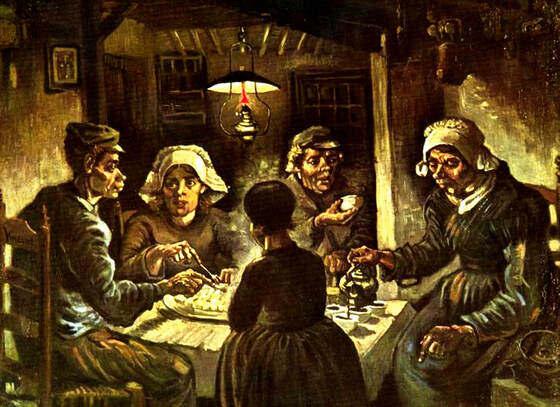|
Scavengers It's one thing to mention the exploding population of dead whitetail deer along the shoulders of our Interstate highways, because who doesn't mind seeing a gentle creature like a whitetail---even a dead one, whose crumpled or swollen but still delicate body provides an opportunity to reflect on our common mortality with tenderness and sincerity but without undue regret, assuming, of course, that you didn't wreck your car and were not the guilty driver. But what of the crushed possum with its hairless tail and toothy grin? And what about those turkey vultures who lately seem to be everywhere, soaring in ever-narrowing circles or else spreading their coarse-feathered wings to dry as they perch on a cell tower. After my father died, and they were about to close his coffin, my mother stepped forward at the very last moment to tuck a fifty-dollar bill into the pocket of his shirt. "Because you were always so worried about money," she said, "but everything will be okay now." And frankly, it took an effort of will to stop myself from pulling that fifty bucks out again because I was, after all, his son, but I held myself back, mainly by thinking about the comforting if unlikelypossibility of some sort of afterlife and the reassuring message provided by grave goods, by those elaborate gold masks entombed with Egyptian pharaohs, or by clay jars of spear points buried alongside Cheyenne warriors, or by dried flower petals in Neanderthal mounds. As a poet who teaches Freshman Composition for a living, I occasionally consider gleaning a misplaced or inexact but nevertheless highly-original turn of phrase from an essay that one of my semi-illiterate students has written, but so far I've managed to resist the impulse to plagiarize although each time I fail to do so means those particular words will never get to live again. Once, at eighteen, I brought a new girlfriend home to meet my family, and she walked into a scene that looked like something like the ugliness and squalor that Van Gogh had depicted in his painting, The Potato Eaters, where the weary faces of the peasants clustered around a table tell us everything we need to know about their poverty and suffering. In our kitchen, a rusty old refrigerator had been wired to a fixture in the ceiling where a single bare bulb hung down, and the holes in the crumbling plaster were cast into high relief. fingering the pennies he'd saved for years in a pickle jar until they could be counted, stacked, and rolled into paper cones. It was almost too much-- I couldn't have staged it better, because I could somehow feel my girlfriend recoil at the grimness and grit, which was, I realized, exactly why I'd brought her home. This is who I am, I'd wanted to tell her. This is what you're in for. But memory has a way of playing cruel tricks because I probably wasn't half that self-aware back then, and the life we'd go on to lead together wouldn't be nearly as bad as that. For these were simply images I'd later scavenge and hoard against a deathless future, the ridiculous possibility of artistic immortality I once imagined I'd get to live. Michael Colonnese Michael Colonnese lives and works in Fayetteville, NC, where he directs the Creative Writing Program at Methodist University and serves as the managing editor of Longleaf Press. He is the author of a mystery novel, Sex and Death, I Suppose, and of two poetry collections, Temporary Agency and Double Feature.
0 Comments
Your comment will be posted after it is approved.
Leave a Reply. |
The Ekphrastic Review
COOKIES/PRIVACY
This site uses cookies to deliver your best navigation experience this time and next. Continuing here means you consent to cookies. Thank you. Join us on Facebook:
July 2024
|




